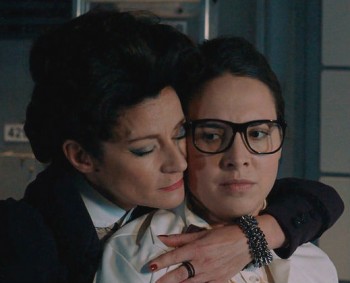In a Doctor Who finale full of shocks and surprises, one of the most brutal was the callous despatching of stand-in fangirl Osgood. The horror, the horror! Was it really worth it?
I’ll confess right up: I was a bit traumatised by the end of Osgood, and I’ve been watching Joss Whedon scripted shows for years (vale Tara, Wash, Coulson, etc, etc). It’s well-established that Russell T Davies looked to Buffy The Vampire Slayer as one of the models for making Doctor Who work in the 21st century, but who would have expected it to be Stephen Moffat who would adopt one of Whedon’s most well worn tricks?
And who would have expected it to be Osgood, one of the show’s most endearing and least threatening characters, who would get killed off in such a swift, callous and meaningless fashion. Whedon would be proud.
“I’m going to kill you in a minute.”
Introduced in Day Of The Doctor, unmissable with her fourth doctor scarf, Osgood was someone that fans could instantly identify with – nicely making Day Of The Doctor as much of a tribute to fans as it was to the show. And then, by her next appearance, it all went horribly wrong: a few moments of truly vicious taunting by Missy before being disintegrated. Oh well, at least Missy made good on her promise.
Why? Stephen? Why?
Well … Osgood died for one simple reason: to let us, the audience, know that for all her light-hearted banter, Missy was ultimately a cold-hearted killer, a died-in-the-wool villain, a complete and utter bastard. Someone you most definitely didn’t want to root for. (And of course we all loved her anyway).
“All of time and space – something for your bucket list.”
I was actually quite upset about this. Osgood, as intimated by the Doctor, would have made a fantastic companion. Philip Sandifer points out, quite rightly, that Osgood had far more mileage left as an ongoing character than as a sacrificial lamb. She was, of course, doomed the moment the Doctor invited her on board the TARDIS: the only reason to give your characters hope for the future is so they have something greater to lose, harmony and satisfaction being the mortal enemies of good drama.
To make matters worse, her death has almost no impact on the plot: Osgood dies, Missy plan continues and the Doctor carries on trying to stop her. It would have been so easy to kill someone else and still prove that Missy was irredeemably evil.
Again: Why? Stephen? Why?
“Why would you bother killing me? I’m not even important.”
 Of course, this is exactly the point: Osgood’s death is completely meaningless – in terms of the plot, at least. Missy had no real practical reason to kill Osgood, and arguably half a dozen reasons to keep her alive. But she didn’t. Osgood’s death has almost no function as far as the plot is concerned: remove that scene and you wouldn’t even realise there was anything missing. In storytelling terms, however, Osgood dies because we needed to know absolutely beyond any doubt that Missy had no compassion and that her grand plan could go to almost any extreme. Osgood’s death is anything but meaningless to us.
Of course, this is exactly the point: Osgood’s death is completely meaningless – in terms of the plot, at least. Missy had no real practical reason to kill Osgood, and arguably half a dozen reasons to keep her alive. But she didn’t. Osgood’s death has almost no function as far as the plot is concerned: remove that scene and you wouldn’t even realise there was anything missing. In storytelling terms, however, Osgood dies because we needed to know absolutely beyond any doubt that Missy had no compassion and that her grand plan could go to almost any extreme. Osgood’s death is anything but meaningless to us.
But did it really have to be Osgood? Think about that scene. Missy kills three people in it. Do you remember the two soldiers she also vaporised. You may or you may not, but do you care about them? Almost certainly not: as characters they haven’t earned any sort of emotional connection with the audience. Missy could kill them, plead for forgiveness and we’d grant it – because those soldiers are barely even characters.
Kill someone like Osgood, however, and we know that the Doctor has no choice at the end of the episode but to kill Missy. If he doesn’t then how many more Osgoods will die? It’s an earned moment: for us to truly believe that the Doctor would consider killing Missy in cold blood, the storyteller has to leave us in no doubt that the Doctor has no other choice.
The ‘bad fan’ problem
And this leads me to one of the most ludicrous complaints about this event: the suggestion that Moffat is delivering a great big fuck-you to his fans by killing off Osgood.
This is based on the simplistic notion that Osgood is meant to represent a Doctor Who fan, and that Moffat had her killed off. It ignores almost everything else about the character, so let’s start with a few of those points:
- she’s smart enough to become one of UNIT’s leading scientists
- she’s been shown to be brave enough to stand up against Zygons, Cybermen and the Master (Missy)
- she’s confident enough in her own identity that she will happily wear ridiculous scarves, bow-ties and converse all-stars to work
So, Moffat demonstrates his hatred for fans by creating one of his strongest characters in their image? Really?
And is the man in charge of one of British television’s most successful shows really so petty as to waste five minutes of one of its most anticipated episodes telling its fans that they should just sod right off?
Doesn’t really add up, does it…?

